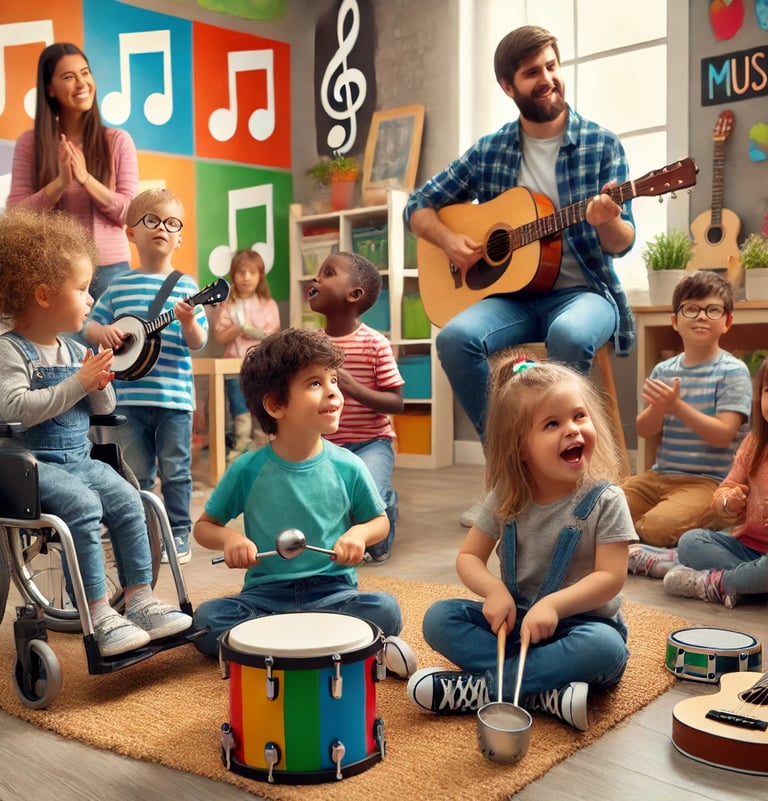The Transformative Power of Music: Enhancing Education for Children with Special Needs
edubeatsworld.com


["This page contains affiliate links. If you purchase through these links, I may earn a small commission at no extra cost to you. Learn more."]
Music is often described as a universal language, capable of transcending barriers of culture, language, and ability. Its transformative power extends beyond mere entertainment, especially when it comes to children with special needs. For children with autism, Down syndrome, cerebral palsy, or other disabilities, music can be a vital educational and therapeutic tool. This blog post explores the profound impact of music in special education, highlighting real-life benefits, case studies, examples from movies, and practical steps for educators and parents.
Understanding the Unique Needs of Special Children
Special needs children often experience challenges in communication, social interaction, emotional regulation, and cognitive development. Traditional education methods may not fully cater to their unique requirements, making alternative approaches essential. Music, with its rhythm, melody, and ability to evoke emotions, serves as a bridge to overcome these challenges.
Why Music Works for Special Needs Children
1.Engages Multiple Brain Areas: Music is a powerful tool that stimulates various parts of the brain, leading to enhanced neural connections and improved cognitive functions.
2.Non-Verbal Communication: For children with speech or language delays, music offers a valuable alternative way to express themselves.
3.Emotional Regulation: Music can effectively alleviate anxiety, lower stress levels, and enhance overall mood.
4.Social Skills: Group activities, such as singing or playing instruments, promote collaboration and encourage social interaction.


Real-Life Benefits of Music in Special Education
1. Improved Communication Skills
Children with autism often face challenges in verbal communication. Research indicates that music therapy can significantly enhance speech development and language skills. Therapists frequently use rhythmic speech and songs to help children learn to form words and sentences.
Case Study: A 7-year-old boy with autism, initially non-verbal, began humming along to songs during music therapy sessions. Over time, he started to repeat simple words in rhythm and eventually formed complete sentences. His parents noted a remarkable improvement in his ability to express his needs and emotions.
2. Enhanced Cognitive Abilities
Music fosters pattern recognition and memory, both crucial for academic success. The rhythmic patterns found in music can also boost mathematical thinking and problem-solving skills.
Example from Movies: In Temple Grandin, a biographical film about a woman with autism who became a prominent animal behavior expert, music helps calm her sensory overload and enhances her focus. The film illustrates how creative and unconventional tools, like music, can facilitate learning.
3. Sensory Regulation
Many children with special needs experience sensory processing issues. Music can help them manage these sensitivities. Soothing melodies or rhythmic beats provide comfort, reduce agitation, and improve focus.
Real-Life Story: Emily, a 10-year-old with sensory processing disorder, struggled to focus in class. Her teacher introduced a daily routine of listening to calming music before lessons, which significantly reduced Emily’s anxiety and improved her attention span.
4. Social Interaction and Teamwork
Group music activities promote collaboration and social bonding. Participating in a choir or playing in a band teaches children valuable skills such as teamwork, turn-taking, and active listening.
Case Study: A school implemented weekly group drumming sessions for children with disabilities. Over time, students who previously avoided interaction began engaging with their peers, smiling, and even initiating conversations.
5. Emotional Expression and Confidence
Music creates a safe space for children to express their emotions. Activities like singing, dancing, or playing an instrument allow them to communicate feelings they may struggle to articulate otherwise.
Example: In the movie Wonder, a boy with facial differences finds solace in music, which helps him build confidence and connect with his classmates. This story highlights music’s role in fostering emotional resilience.
Practical Steps for Educators and Parents
1. Incorporate Music into Daily Routines
Use songs to signal transitions, such as clean-up time or snack time, to create structure and predictability.
Play calming music during stressful moments to help soothe anxiety and promote relaxation.
2. Leverage Music Therapy
Consult certified music therapists who specialize in working with children with special needs to develop tailored approaches.
Utilize apps like Sing Up or Soundtrap for guided music activities that can enhance engagement and learning.
3. Encourage Participation in Music Programs
Enroll children in inclusive music classes or choirs that promote social interaction and teamwork.
Provide adaptive instruments that cater to the child's abilities, ensuring they can participate fully and enjoy the experience.
4. Create Personalized Playlists
Identify music that resonates with the child’s preferences and needs, fostering a connection to the activity.
Use playlists for different purposes, such as relaxation, focus, or motivation, to support various learning and emotional goals.
5. Engage in Family Music Activities
Host family sing-alongs or dance nights to strengthen family bonds and create joyful experiences together.
Explore musical games like Freeze Dance to promote bonding, coordination, and movement in a fun and engaging way.
Inspiring Stories of Transformation
The Story of Jacob
Jacob, an 8-year-old boy with Down syndrome, faced challenges with low confidence and social anxiety. His parents decided to enroll him in a music therapy program, where he learned to play the piano. Over the course of a year, Jacob's confidence blossomed. He even performed at his school's talent show, earning a standing ovation from the audience. His parents credited music with unlocking his potential and helping him connect more deeply with others.
The Miracle of El Sistema
El Sistema is a revolutionary music education program in Venezuela that has transformed thousands of lives, particularly for disadvantaged and special needs children. Through the program, children learn to play classical instruments, which not only enhances their musical skills but also instills essential values like discipline, teamwork, and hope for a brighter future.
Examples from Research and Studies
University of Miami Study: Researchers found that children with autism who participated in music therapy exhibited significant improvements in social behaviors and communication skills compared to those who did not engage in such therapy.
Nordoff-Robbins Music Therapy: This approach utilizes improvisational music to address the unique needs of children with disabilities, demonstrating documented success in boosting emotional well-being and enhancing social interaction.
The Role of Educators and Policymakers
Creating an inclusive educational environment requires collaboration among educators, parents, and policymakers. Schools should take the following steps:
Integrate music therapy into Individualized Education Programs (IEPs).
Provide training for teachers on utilizing music as a teaching and engagement tool.
Allocate funding for adaptive instruments and comprehensive music programs.
Conclusion
The transformative power of music lies in its ability to connect, heal, and inspire. For children with special needs, music offers an invaluable pathway to overcome challenges, unlock potential, and thrive in ways that traditional educational methods may not achieve. By embracing music as a cornerstone of special education, we can foster a more inclusive and compassionate world where every child’s abilities are celebrated. Let’s make music not just a subject but a bridge to brighter futures for all children.
RELATED POSTS
contact@edubeatsworld.com
© 2024. All rights reserved.
